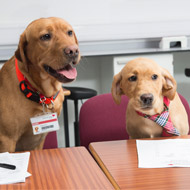
Dogs help to assess candidates’ ability to communicate
Veterinary nursing hopefuls applying to study at Edinburgh Napier University have been put through their paces by a family of fox red Labradors.
Mum Tia, dad Simba and puppy Fern helped to ‘interview’ applicants at the university’s Sighthill campus.
To assess the applicants’ ability to communicate with both animals and humans, academic staff set the dogs loose among applicants whilst they were taking part in a group discussion.
The dogs also helped to create a tension-free atmosphere, encouraging the candidates to relax and perform to the best of their ability.
“Having dogs present in interviews, in particular good quality Labradors, tests the aptitude of potential students for dealing with animals,” said Jodie Smith, lecturer and programme recruitment officer.
“Their presence also helps the assessors hone in on candidates’ intuitive skills for working with dogs, which make up a large proportion of the patients in any veterinary practice.”
This is not the first time the university has used dogs as part of its selection process. Tia, Simba and Fern were also used in communication skills group exercises involving a dozen prospective students.
The dogs come from breeders Saber’s Pride and are training with the charity APPAWS to become therapy dogs for people with autism. Fox red Labradors are thought to have the right combination of skills to calm, and communicate with, autistic adults and children.
“Each year we have very tough competition for places on the BSc (Hons) veterinary nursing programme,” Jodie continued. “Incorporating dogs into the selection procedure allows applicants to display their skills in an authentic setting and greatly helps the decision-making process.”
Image (C) Edinburgh Napier University



 The latest
The latest